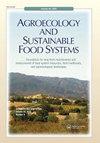农业生态学对拉丁美洲气候变率和变化下的减缓、适应和复原力作出贡献的证据
IF 2.6
3区 农林科学
Q1 AGRICULTURE, MULTIDISCIPLINARY
引用次数: 0
摘要
农业生态学作为应对气候变化的一种全面而有效的对策,在研究和发展话语中得到了大力推广。本研究的目的是促进对现有证据的分析,这些证据表明农业生态学能够在拉丁美洲的农业系统中适应和减缓气候变化(CC),该地区以开拓性地发展这一科学、实践和运动而闻名。我们采用PRISMA方法分析现有文献提供的证据。利益相关者访谈是为了深入了解农业生态学对气候变化适应和缓解的贡献,访谈对象包括哥伦比亚、厄瓜多尔和秘鲁的广泛行为者和发展实践者:农民、非政府组织代表、研究人员、大学项目负责人和政府官员。从最初确定的1821篇文章中,筛选了62篇,分析了24个案例研究的方法和提供的证据。采访了26位利益相关者。结合定量和定性评估方法,科学文献表明,农业生态系统因以系统的方式解决复原力而受到赞赏,因此不仅仅是气候变化本身。缓解措施一般采用定量方法进行评估。将利益相关者的话语整合到我们的分析中,突出了他们对有助于农场抵御气候变化的基本过程的了解,其中作物和动物多样化以及将树木整合到农业系统中是核心。利益攸关方认为农林业和减少使用合成肥料是缓解的重要作用。我们的研究强调了将证据和来自多个利益相关者的看法的系统分析相结合的相关性,以认识到农业生态学对气候变化适应和恢复力的积极贡献。然而,它也指出,未来的研究将进一步评估农业生态实践、缓解和复原力在多个尺度上的具体权衡和协同作用。这对于动员和更好地定位仍然缺乏的公共机构和捐助者的支持将是重要的。本文章由计算机程序翻译,如有差异,请以英文原文为准。
Evidence of agroecology’s contribution to mitigation, adaptation, and resilience under climate variability and change in Latin America
Agroecology is highly promoted in research and development discourse as a holistic and effective response to climate change. The objective of this study is to contribute to the analysis of the existing evidence that agroecology enables climate change (CC) adaptation and mitigation in the agricultural systems of Latin America, a region known for pioneering the development of this science, praxis, and movement. We applied the PRISMA method to analyze the existing literature providing such evidence. Stakeholder interviews were used to obtain in-depth perceptions of agroecology’s contributions to CC adaptation and mitigation from a wide range of actors and development practitioners based in Colombia, Ecuador, and Peru: farmers, NGO representatives, researchers, university program leaders, and public officials. From a total of 1821 initially identified articles, 62 were screened, and 24 case studies analyzed for methods and evidence provided. Twenty-six stakeholders were interviewed. Combining quantitative and qualitative assessment methods, the scientific literature shows that agroecological systems are appreciated for addressing resilience in a systemic way hence not just climate change per se. Mitigation was generally assess by quantitative approaches. Integrating stakeholders’ discourse to our analysis highlighted their knowledge of underlying processes contributing to farm CC resilience, where crop and animal diversification and integration of trees into farming systems are central. Stakeholders attributed agroforestry and less use of synthetic fertilizers as important roles for mitigation. Our study highlights the pertinence of combining systematic analyses of the evidence and perceptions drawn from a plurality of stakeholders to recognize the positive contribution of agroecology to climate change adaptation and resilience. However, it also pointed to future research that further assesses the specific trade-offs and synergies between agroecological practices, mitigation, and resilience at multiple scales. This will be important to mobilize and better orient the support from public institutions and donors that remains lacking on the ground.
求助全文
通过发布文献求助,成功后即可免费获取论文全文。
去求助
来源期刊

Agroecology and Sustainable Food Systems
AGRICULTURE, MULTIDISCIPLINARY-GREEN & SUSTAINABLE SCIENCE & TECHNOLOGY
CiteScore
4.80
自引率
7.70%
发文量
73
期刊介绍:
Agroecology and Sustainable Food Systems is devoted to the rapidly emerging fields of agroecology and food system sustainability. By linking scientific inquiry and productive practice with transformative social action, agroecology provides a foundation for developing the alternative food systems of the future. The journal focuses on the changes that need to occur in the design and management of our food systems in order to balance natural resource use and environmental protection with the needs of production, economic viability, food security, and the social well-being of all people.
Agroecology and Sustainable Food Systems examines our current food systems from production to consumption, and the urgent need to transition to long-term sustainability. The journal promotes the study and application of agroecology for developing alternatives to the complex problems of resource depletion, environmental degradation, a narrowing of agrobiodiversity, continued world hunger, consolidation and industrialization of the food system, climate change, and the loss of farm land. The journal uses a food systems approach, and seeks experiences in agroecology that are on-farm, participatory, change-oriented, and backed by broad-based methodologies of sustainability analysis and evaluation.
 求助内容:
求助内容: 应助结果提醒方式:
应助结果提醒方式:


